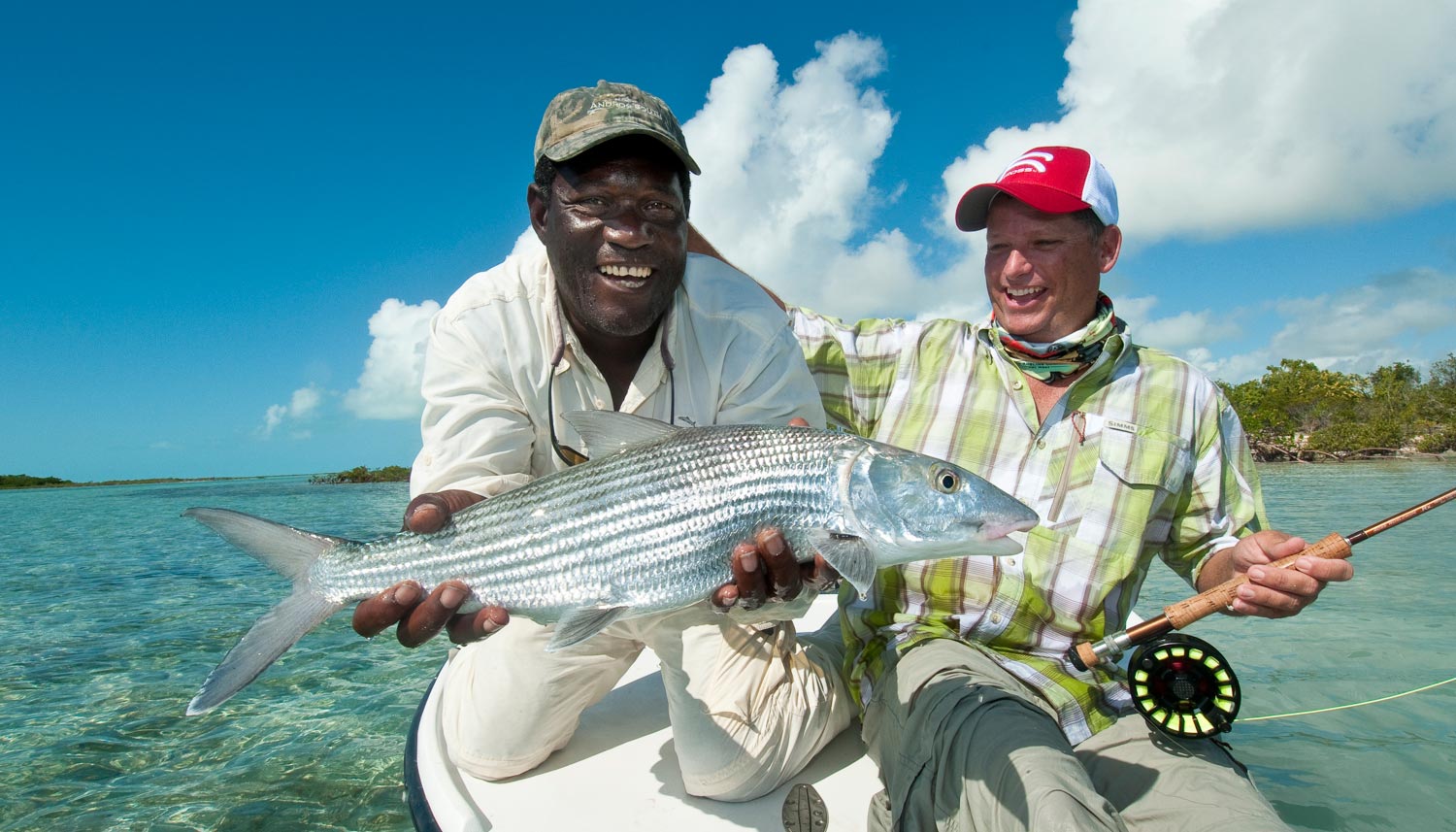By Louis Cahill
Concentration, Relaxation and Communication. I wish I could claim those words.
I’m quoting Jose Sands, bonefish guide at Andros South Bonefish Lodge. That was his answer when I asked what he thought was the key to successful bonefishing. As usual, he nailed it.
Plenty of anglers are frustrated or intimidated by bonefish. Bonefishing is a complex game with a lot of moving parts and all too often what should be a simple formula breaks down completely. When that happens it’s usually because one or more elements in Jose’s recipe are missing. It’s easier said than done but if you can accomplish these three things, the pieces start to fall into place.
Communication
Most saltwater fishing is a team sport. Whether fishing with friends or a guide, you are generally depending on someone else to help you find fish and make a good presentation. Things happen quickly and everyone needs to be on the same page and communicating efficiently to make it work.
There are some universal ideas that everyone needs to understand in order to have good communication. Understanding the bow clock, for instance. When your guide tells you there is a fish at eleven o’clock, forty feet, moving right, it should be a simple thing to find that fish. You learn pretty quickly however, that everyone’s forty feet is not the same and even your guide will occasionally lose track of where eleven o’clock is.
It pays to take a minute at the start of the day to pick an object like a mangrove sprout and decide how far away it is. That helps you calibrate for the day. I find that guides often call out distances that seem much farther than I think is realistic. Not because they don’t know how far away the fish is, but because we are looking at it from very different perspectives. Mine on the bow, and there’s, from the platform at the back of the boat. It’s also worth the time it takes to look at the bow of the boat and confirm where twelve o’clock actually is before you waste a lot of time looking for fish in the wrong spot.
Guides will also use terms like “drop the fly” and “shoot the fly,” to indicate how it should be presented. Drop means you are already carrying enough line for a good presentation, while shoot indicates that you need to let some line go on your delivery. These kinds of directions vary from guide to guide, so take the time to ask early on. It’s impossible to over emphasize the importance of good communication.
I have about a 40% hearing loss and it’s a huge challenge for me. I remind my guide several times during the start of the day that I am deaf as a post. No guide likes to shout in the presence of bonefish but if I can’t hear their direction we both wind up frustrated.
Concentration
The thing I enjoy the most about bonefishing is the same thing that makes it so difficult. It’s a game of strategy with a lot of variables. The wind, light, tide and movement of both the fish and boat play huge rolls in the formulation of a good shot, as do many other variables. You have to stay focused and make good decisions for everything to work in your favor.
It’s easy to get caught day dreaming on the bow and not have all of the information you need when the fish shows itself. You should keep a constant awareness of things like current speed and movement, light direction and wind. You need to stay aware of what your leash is doing and if your stripping line is clear.
Most of all, you have to read the actions of the fish. You need to know if he is traveling or meandering. Is he in a spot where he is likely to be on high alert or more comfortable? Does he need a long lead or should you drop the fly beside him? His mannerisms will tell you everything you need to know but you have to be observant.
Good casting takes focus too. You almost always have wind to think about, and when you don’t, a soft presentation is a must. You need to be confident in the mechanics of your cast and focused on loop control and accuracy. Mental focus pays off big.
Relaxation
I’ve saved the best for last. Relaxation may be the most important of the three because without it, the other two are not possible. When I think back over the shots I’ve blown, or seen blown, the most common cause is the angler losing focus because of stress.
This is most often a result of buck fever. Anglers who are not 100% confident will experience brain lock in the presence of bonefish. Even confident anglers can freeze up when the fish in question edges over the ten pound mark.
A deep breath is time well spent on the bow. Remember, it’s only a fish. It may be an incredibly challenging fish but it is still way down the food chain from most of us. With a little focus you can get the better of it. No one catches every bonefish they see. When you blow a shot, put it behind you. Don’t carry that frustration over to the next shot.
I’ve seen anglers completely melt down on the bow. When the cumulative frustration of multiple missed opportunities starts to get to you, take some time out. Let your buddy fish a while and get your head straight. Most of all be honest with yourself. Most of us are neither as good or as bad an angler as we tell ourselves at any given time. We are all imperfect and in a constant state of learning.
It’s very common for anglers to stress about what other anglers think of their performance. That is the most common cause of the angler melt down. Let me tell you, it doesn’t matter. How well you fish is of no concern to anyone but yourself. If you are fishing with an angler who is much more advanced than you, remember he was once where you are. He knows better than you how every missed shot stings. Don’t sweat it. Just relax and enjoy yourself. There really is no other point.


I too have a significant hearing loss. Wearing a hearing aid has improved the quality of my life. I can hear the bell on by bird dog. I can have a conversation with my son who is on the oars in the driftboat. I can hear the song of birds. Do you wear a hearing aid?
12 O’clock does not seem to be the one that I miss but it is 3 or 9 O’clock. When I am on the bow and he is on the platform on the stern, his 3 O’clock might actually be my 5 O’clock. I had one guide get frustrated with me because he was saying. “there is a pair at 9 O’clock at 40 feet.” And I could not see them. He finally took his pole and pointed at them and they were at his 9 O’clock. I was looking perpendicular from the bow for them but they were 40′ at a back angle.
The bow can be a humbling spotlight for sure. You have have likely mentioned this tip before but when communication starts to break down between you and the guide point the tip of your rod in the direction of where you think he’s telling you to cast and he can then fine tune the direction of your cast and improve your chances at seeing the fish……seeing makes all the difference in your casting success
I have found it helpful if the guide tells you to point your rod then to move it one way until it is in line with the fish. While, it takes a little time, can work pretty quickly with a little practice. Helps a ton to find the fish asap.
Is there a hands free short distance radio device which can be worn by the guide and the angler to facilitate better language understanding in the presence of hearing impairment? If so, where could one be obtained?
I’ve wondered that myself. I have a 50% hearing loss. I often rely on my fishing partner to relay information.